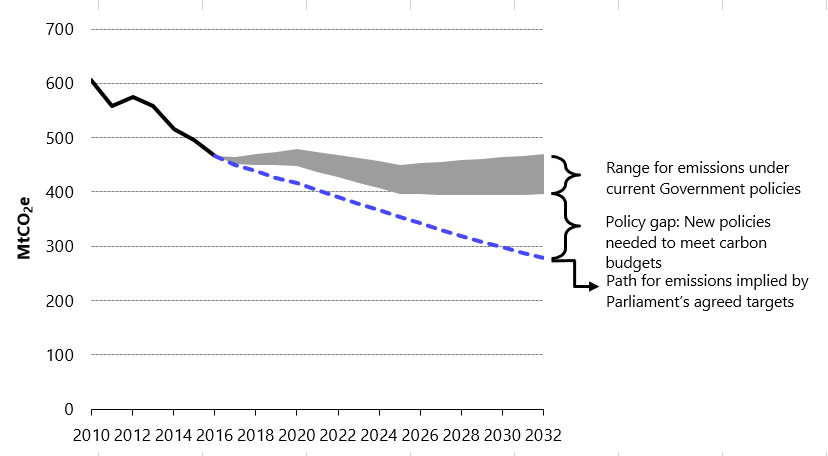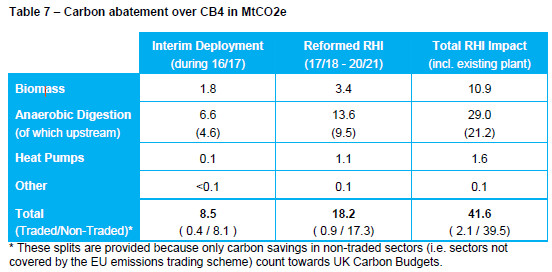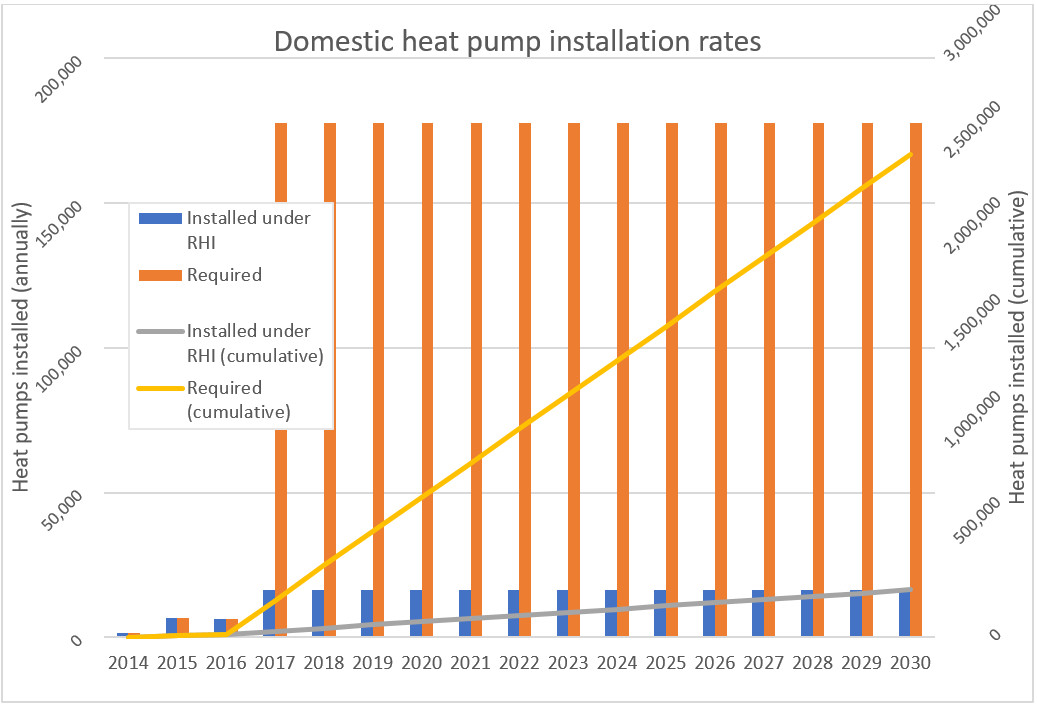The government’s recent announcements relating to the reform of the Renewable Heat Incentive (RHI) address some important technical issues; however, whilst working through the detail for our briefing for Regen members it quickly became clear there remains a chasm between the outcomes of current policy in this area and the legally binding carbon targets the UK is committed to.
The government’s carbon budget requires a 57% reduction in greenhouse gas emissions from 1990 to 2030. Despite significant progress having been made to date, there is still a long way to go and an increasing gap is evident between the projected outcomes of current policy and our stated target, as shown in the graph below.

Graph showing carbon target and projected actual emissions for UK, taken from this report.
The impressive recent progress in greenhouse gas emissions reductions (measured in tonnes of carbon dioxide equivalent – tCO2e) has come mainly from the power generation sector, due to the reduction in use of coal fired plant and the increase in renewable electricity generation (mainly from solar PV and wind). Emissions from buildings and transport actually increased between 2015 and 2016, with transport emissions higher in 2016 than any year since 2009.
Impact of the RHI
As shown in the table below, (taken from the RHI impact assessment report, Pg. 23) it is estimated that the total impact of the RHI in Carbon Budget 4 (2023-2027) will be the abatement of 39.5MtCO2e of non-traded greenhouse gas emissions. More than 53% of these projected savings are as a result of increased deployment of Anaerobic Digestion and the resultant avoided emissions by directing feedstock such as food waste from landfill (where it would have otherwise generated methane, a highly potent greenhouse gas), 20% are as a result of fossil fuels displaced by the resulting biogas, 27% are as a result of biomass schemes, the remainder is heat pumps and ‘other’.

So, whilst the aims and achievements of the RHI are commendable, this means that over half of the projected outcome in this period (2023-2027) has arguably very little to do with renewable heat and more to do with waste management policy. Although a globally significant flagship scheme, the RHI is only going to be one part of the answer to reducing carbon emissions from heating.
Closing the gap
Clearly, we need much more radical change in our energy policy to meet targets, particularly in relation to the built environment.
Given that the power generation sector has made improvements above initial ambitions, and as indicated here, one approach is a policy drive towards large scale electrification of heating and transport.
One scenario put forward by the Climate Change Committee for meeting the carbon budget (here, pg. 13) includes the deployment of 2.5m heat pumps by 2030*. To date the domestic RHI has delivered 36,474 heat pumps (17,841 of which were legacy i.e pre-RHI), at an average rate of around 6,200/year. The recent RHI impact assessment (Pg. 38, Table 17) shows an ‘Illustrative assessment of market potential’ for deployment of domestic heat pumps at 16,500/year. Meeting the 2.5m target would require over 205,000 heat pumps to be delivered annually between now and 2030, quite a leap from current rates.
*The same scenario includes 40TWh of low-carbon heat networks and 20TWh of biomethane to the gas grid, far above current projections and something to be explored in future posts.

As the Climate Change Committee report concludes it is clear that heat pumps alone won’t be the answer and we need for “A clear, combined strategy for energy efficiency and low-carbon heat”. The report points to a mixed technology approach “it must significantly increase the delivery of energy efficiency measures, heat networks and heat pumps in cost-effective locations for both households and businesses. It should also test the possibility for low-carbon hydrogen to meet heat demand.”
Not only does a new strategy on low-carbon heat and energy efficiency need to address the carbon gap, in needs to show that it can deliver on a much greater scale than the RHI has achieved. We will be looking closely at in the long promised Clean Growth Plan, rumoured to be released shortly, to see if the government has a credible approach or has continued to kick the can down the road.
Regen will be exploring the future for low carbon, sustainable heating at our Renewable Futures conference, taking place in Bath on 28th November
